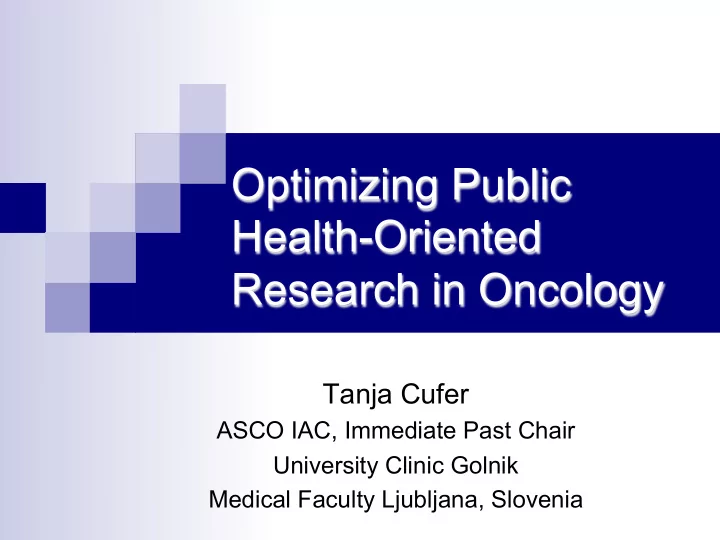

Optimizing Public Health-Oriented Research in Oncology Tanja Cufer ASCO IAC, Immediate Past Chair University Clinic Golnik Medical Faculty Ljubljana, Slovenia
Caner and Public Health n With growing incidence and mortality cancer is becoming a huge public health issue (UN High- level Meeting, September 2011) n Major advanced in cancer care/control have been achieved through cancer research, aimed to benefit a whole population Public health: “The approach to medicine that is concerned with the health of the community as a whole”.
Public Health-Oriented Cancer Research: Wishful Thinking or Reality? ü Epidemiological trials Mainly ü Prevention trials population ü Cancer health care disparities based ! ü Cancer health care services n Interventional trials – selected collectives of patients, oriented to drug development, diversity of end-points, lack of emphasis on socio-economic and long term outcomes
• Erlotinib plus gemcitabine approved for treatment of pancreatic cancer by FDA • One of the standard therapies according to NCCC, ESMO The trivial benefit of adding erlotinib to guidelines gemcitabine can be lost in oncologic practice !
Updated FDA labels of 12 targeted drugs and 36 corresponding RCTs: • 38% of all SAEs not described in any published report of RCTs • 49% of all SAEs not described in initial drug label Serious and late toxicities not reported in RCTs • 42% (n=5) drugs acquired at least one Box warning can cause toxic deaths in oncologic practice ! after median FU of 43 months.
How to Optimize Public Health-Oriented Cancer Research ? Adaptation of classic research n Academia-driven research n Independent funding n Global research consortia New approaches n Clinical datasets n Research datasets Ø Central knowledge systems
Academic Cancer Research n Performing all types of clinical trials: screening, prevention, diagnostic, quality of life, not only treatment trials n Exploring multidisciplinary treatment strategies in oncology n Exploring survivorship, late side eefcts and socio- economic issues n Enabling the best possible control over the patients Academic cancer research is capable to test and data and tissue banking develop new multidisciplinary prevention, treatment n Providing independent and sustainable objective and follow-up strategies for better control cancer. evaluation and reporting of data
ASCO IAC Survey: How would you consider your ability to conduct ADCT/IDCT during the last five years? 30% 31% 50% 34% 20% 35% p=0.001 p=0.009 ASCO 2012, Abstract e16505
ASCO IAC Survey: Major obstacles for Academia-driven cancer research Ranked from 1 (most) to 8 (least) important Average rank HIC (n=41) LMIC (n=39) 4.25 4.61 3.87 Competent authorities procedures 4.55 4.80 4.28 Ethics committee procedures Insurance/indemnification coverage 4.55 4.54 4.56 5.43 5.27 5.59 Lack of patients/patient accrual 3.16 3.15 3.18 Lack of funding 4.49 4.49 4.49 Lack of research materials, e.g. drugs Lack of trained personnel 5.00 4.90 5.10 4.58 4.24 4.92 Lack of time or competing priorities funding vs. rest significant; patients vs. rest (except personnel) significant marks change in obstacle distribution when stratified by country income ASCO 2012, Abstract e16505
� � ASCO’S ONCOLOGY � RLS � • Lakeman CE, Am J Pub Health, 1915 :” There is and will be a continuing need of a central clearing house of information and statistics in regard to cancer ”.
European Conference THE BURDEN OF CANCER – HOW IT CAN BE REDUCED Workshop IV CANCER RESEARCH – FINDING NEW SOLUTIONS FOCUSING ON PUBLIC HEALTH-RELATED RESEARCH • With continuous ageing of the population cancer remains one of the major public health related issues and challenges in Europe. New developments in cancer research need to be rapidly put into use in a way that benefits not only individual patients but the whole society. Ø To achieve this, public health-related cancer research in all areas from prevention, screening, treatment and palliative, is to be promoted. FP7 with its new public health-related research focus is a very good start. On the national basis each of the member states should encourage public health-related cancer research and support this with new funding. 7 Brdo, Slovenia 7- 8 February 2008
To conclude, To To reach the goal of 25% canc ncer mortality reduc uction n by 2025, pub ublic health-orient nted canc ncer research is mand ndatory! n The outcome will depend on our ability and willingness to: Ø Raise awareness of the importance of public health- oriented research Ø Increase academia driven research and its funding Ø Enhance international collaboration in clinical trials Ø Develop clinical and research datasets and boost applied research Ø Train the next generation of oncologists on public health- oriented cancer research
Th Thank nk you, u, and nd cordially inv nvited to the ne next ICTW CTW in n Opatija-Cr Croatia, June une 19-20 2013!
Recommend
More recommend